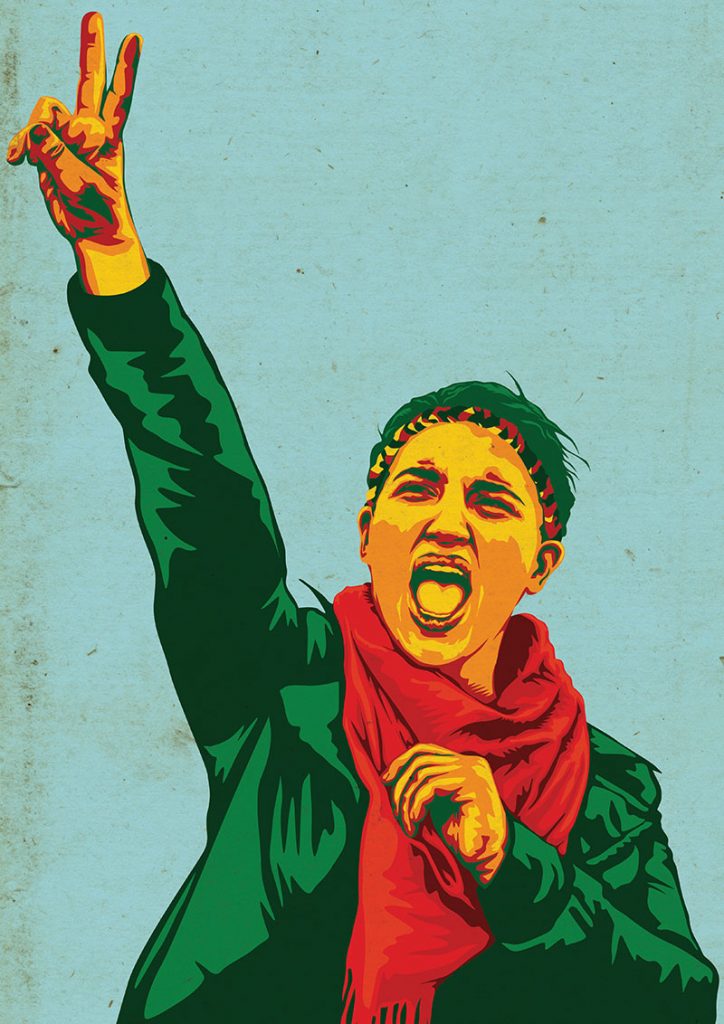Kurdistan // Jineoloji and the struggle of Kurdish women~ 7 min

Note: This is a revised version of an article originally published on February 28, 2017.
What is Jineoloji
Jineoloji is a new scientific perspective developed by Kurdish women since 2011 and centered on women’s social reality from a feminine perspective. Through this new perspective, women propose a methodology that reverses the male dominant viewpoint on women’s existence, the Eurocentric, racist, gender and class-specific scientific approaches that until now saw women as an object of study, perpetuating social power structures as well as their methods of knowledge production. As asserted by Kurdish women, Jineoloji emerges as a response, a radical intervention and an alternative epistemology against the patriarchal mindset, seeing social sciences as a product of this mindset and serving as the tool of hegemony, state monopoly on human life and the perpetuation of capitalist modernity.
Working from Öcalan’s – the intellectual leader of the Kurdish liberation movement – premise that “Woman is the historical-society’s colony nation which has reached its worst position within the nation-state (…) Woman’s slavery is the most profound and disguised social area where all types of slavery, oppression and colonization are realized.” (Öcalan, Democratic Confederalism, p. 17), Jineoloji makes its objective to reveal the thousands of years of dissimulation of women’s existence, identity, history, emotional and intellectual reality, as well as her exploitation and enslavement, which is maintained by capitalism, modernity and state discourses.
In response to this, Jineoloji aims to make the ontology and history of women visible and expose women’s contributions and creations alongside the history of civilization that has so far been rendered invisible, by principally looking into philosophy, science, religion, mythology and morality among other fields in order to redefine science through the foundation of women’s own significations, rewriting the ‘history’ of humanity from a different point of reference that does not neglect the role that women undertook in the construction of society and communal life. That is why Kurdish women highlight the common origins of the words Jîn (woman) and Jîyan (life); Jineoloji, thus, is not only the quest for women’s truth but also for life.
History of the women’s movement
On the other hand, Jineoloji should be interpreted as part of the Kurdish liberation struggle, its ongoing intellectual, ideological-political self-defense and mobilization that challenges the colonization of the entire society. The decades long Kurdish struggle since the 1990’s has placed women’s liberation at its epicenter with the motto “Women’s liberation is the liberation of society” which also reverberated in the internal transformation of the struggle organized dominantly – although not uniquely- under the PKK (Kurdish Worker’s Party). From 1987 on, women began their autonomous organization under various structures and in various forms:
- 1993 – Formation of the women’s army.
- 1996 – Theory and practice for the emancipation from the patriarchal system.
- 1998 – Women’s liberation ideology.
- 1999 – Party formation.
- 2000 on – Construction of a social system within the framework of a democratic, ecological, and gender-egalitarian societal paradigm.
Such autonomous organization allowed them to take part in the political, social and military arenas of the liberation struggle as the equals of men. It also signified a challenge to the gender dichotomy that nationalism created when it defined the state and the army as protector male institutions and women as the protected. It also linked the idea of women’s liberation to the liberation of the entire people. The participation of women in the anti-colonial struggle offered a way to challenge the colonial order’s definition of women as oppressed while it made clear that women were not willing to subsume their struggle into the “larger” struggle against capital and wait until the national and socialist liberation was achieved in order to deal with women’s liberation.
The creation of women’s own spaces also confronted the male-dominated, patriarchal and chauvinistic sociopolitical arena that overshadowed women’s own experiences, forcing them to take on a masculine attitude to be able to have a voice in every aspect of society.
Jineoloji finds its meaning in the sociology of freedom; the freedom of women, men and society. As women assert “This is the task of all anti-colonialist, anti-capitalist, anti-power movements, individuals, women. We refer to these alternative social sciences as the sociology of freedom”. Jineoloji is the affirmation of the idea that those who cannot think for “themselves, who cannot think with their own perspectives deriving from their own life experiences, cannot govern themselves, and hence cannot be free. That is the departure point of Jineoloji. Yet it is also a step to alter socialist paradigms that longed for a freer, more equal and just life yet have not been able to resolve their internal inconsistencies, pushing aside the oppression on women.
Although feminist studies have already put forward substantial contributions and theories denouncing societal sexism from different perspectives which also nurture and strengthen Jineoloji, this new perspective marks a distinction between the two approaches. In this sense, Jineology is a result and continuation of the experiences and efforts of feminist movements, yet it does not refrain from raising a criticism to feminism, which was unable to overcome liberal and reformist perspectives and actually helped relieve the contradictions of the dominant system and thus became dependent on state structures instead of becoming an engine for social transformation and women’s autonomous sociopolitical organization.
Thus, Jineoloji claims to highlight the communal experiences of women and push forward collective and practical responses regarding women’s problems to be able to build a new society beyond the limits of the one in which we live today. And indeed it keeps its word.
Jineoloji in practice
Today, mainly in Rojava but also, to a lesser extent, during the initial phase of the social transformation in Bakûr, Jineoloji and women’s liberation comes to life in women’s autonomous assemblies which make their own decisions about women’s issues which are not open to negotiation with men. There is also a rule of co-presidency – all organizations must always have a man and woman representative and a minimum women quota of 40%, guaranteeing the presence of women in decision-making processes.
Women have also managed to outlaw polygamy and forced marriages and continue to form their own separate structures, from healthcare to education to law-making and justice to economy. Mala Jîn, literally “women’s house”, functions as a popular house of justice, treating a wide range of issues regarding women’s conditions – forced marriages, husbands who take second wives, domestic abuse and so on – and deciding on retributions or serving as mediators between the two parties. Women’s cooperatives flourish in many Kurdish areas, proving that the struggle is not only a mental or cultural liberation but also about exploitation and economic freedom.
Moreover, women’s academies are being founded, run entirely by women, where the community decides which subjects will be addressed. Academies do not function as a university in the classical sense, with a hierarchical structure and a separation between the tutors and pupils, but provide spaces for sharing knowledge and experience. Jineoloji is also being taught at high schools to raise consciousness from an early age about gender equality.
During one of our talks with our Kurdish comrades, we were also informed that they are planning to build ecological women’s communes as an alternative to the women’s shelters, which they see as prisons for women that penalize women rather than the perpetrators and do not aim to reintegrate the victims of patriarchy and male violence but are only short time solutions that look for individual answers to social problems.
The examples multiply every day, showing how the chasms created by patriarchy and male-dominated mentality are being built over by the will of the Kurdish women to create an equal and just society in which their own efforts are no longer overlooked.
The Serhildans, people’s uprisings against Kurdistan’s colonization, ignited and led by women many years ago, blossom today with the flourishing of new communes, cooperatives, women’s houses, with every women taking part in the liberation struggle. The well-known Kurdish exclamation of rage or suffering, zılgıt, is today shouted with joy and vitality.




